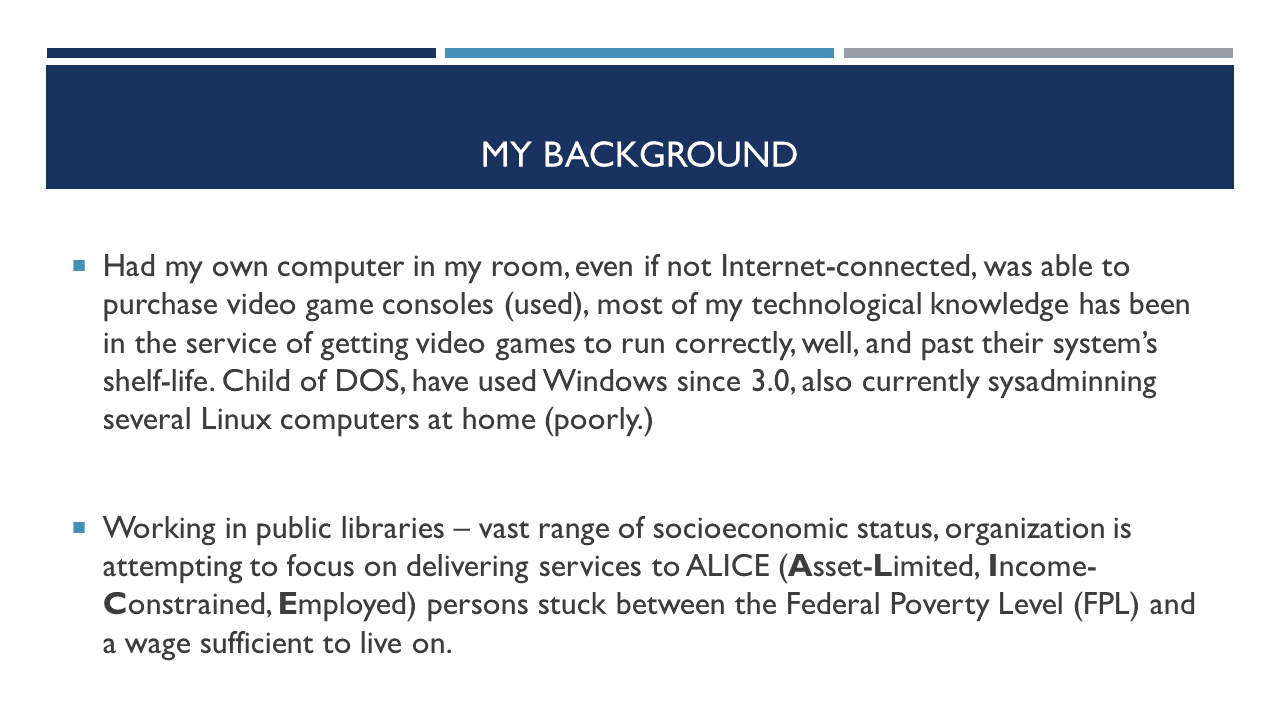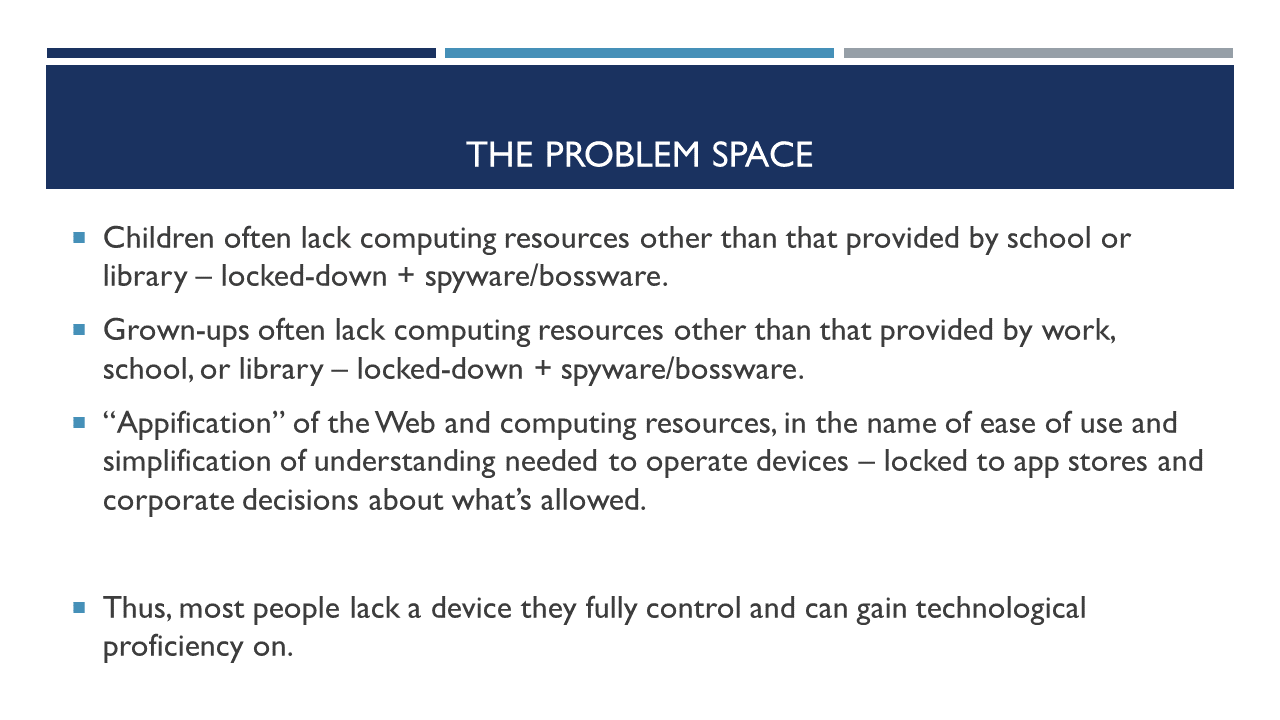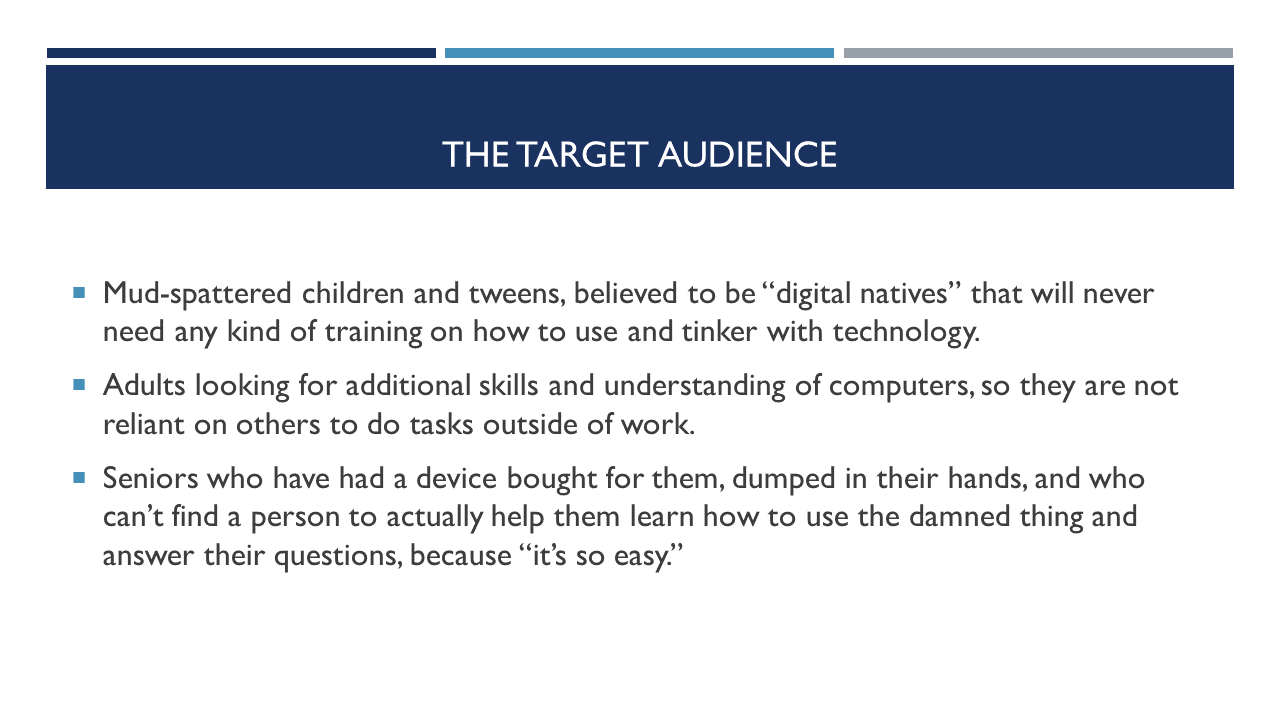
Let's start with a little bit of my background. I've been a tinkerer with computers for most of my life, including that rare privilege of being able to have a computer in my own room as a child, and having taken apart and upgraded that computer repeatedly over time as I was able to source components for it. Beyond that, I've installed, reinstalled, upgraded, and worked with various operating systems, including MS-DOS, Windows from version 3.0 onward, and various flavors of Linux once I had a computer that it would play nicely with.
Most of that work has been in the service of trying to get video games to work so I could play them on my own computers, and on a child's budget, each component is usually carefully chosen and saved for so that maximum effect can be achieved for the available monies. These days, I have more freedom to spend money and can therefore occasionally dedicate a small computer to a single-ish task, rather than having to make one machine (or two) do everything that I want to have happen. All told, that gives me thirty-*cough* years of experience with trying to build and work with machines inexpensively.
In my professional life, I work as a librarian in a public-facing setting, which means I have a vast range of grownups and children that I see regularly, and who have an entire spectrum of technology issues and questions they have for me and the other people I work with. My organization has recently adopted a focus on working with people who are ALICE: Asset Limited, Income Constrained, Employed. ALICE folks are working, sometimes multiple jobs, but they generally don't have deep reserves to draw on in case of expensive emergencies, they're not usually building assets that they can draw on later on in life, and the money they're making might be enough to get them from one month to the next, but it's not likely to be more than that. What that means, though, is that ALICE folks are usually making more money than the Federal Poverty Level (FPL) and therefore don't qualify for many of the assistance programs put in place by U.S. state or federal governments, but less money than they would need to comfortably live on their wages and to put some away for savings and emergencies.

The problem space we're looking at is more general than ALICE families, but ALICE families are more likely to be in this problem space than others, so a solution that works for them will likely apply well to those outside of the ALICE space.
Both children and grown-ups often find themselves with computing resources that have been provided to them by either their schools or their employers. Because the schools/employers want to protect the assets that they've purchased and to ensure that unauthorized activities do not take place on their machines, most of the computers provided by schools or employers have been locked down in one way or another, so that all of their functions are not available to the user. Many of these machines also have monitoring software installed on them so that attempted unauthorized use is captured and reported to the school or employer so that disciplinary action follows. Spyware, bossware, and locked functions indicate a lack of trust between the issuing authority and the user about what appropriate use is.
Public access computers, such as those available at public libraries, are often subjected to the same kinds of constraints and locking of functions, along with some of the same kinds of reporting functions in case of misuse or illegal activities, and children are usually subjected to filtered internet access as a requirement of the Children's Internet Protection Act, which ties necessary discounts on computer equipment and services ("e-rate discounts") to the use of "technology prevention measures" to restrict a child's access to unapproved portions of the Internet. So while the library computers may be more open than school computers, they are not open in the way we would like them to be.
A significant number of low-cost technology options change the general-purpose computer into an app device, where what the machine can do is mediated by whatever the "app store" carries. Most computers that have been changed into app devices have a significant amount of their functionality locked away. Much of this simplification and locking is intended to prevent malicious apps from entering the ecosystem, but also has the knock-on effect of subjecting the user to whatever the app store creator believes is "appropriate" functions for the device to have. What the app store creator determines is appropriate is usually heavily influenced, if not outright dictated, by advertisers who will be extremely cross if their ad appears on a post about content they would not want associated with their brand.
Thus, the problem we are facing is that most people do not have a general-purpose computing device that they can exercise full control over. That lack of control over their device impedes gaining proficiency in not just the device, but the general concepts underlying the specific implementation a device may have that are transferable to other situations in their lives where they must navigate unfamiliar situations.

The target audience, then, for a hypothetical give-away computer is vast and spans most demographic categories. Mud-spattered children, tweenagers, and teenagers who have been told all of their lives that they are "digital natives" and therefore need absolutely no training at all on how to use computers, because they've been using them all their lives and have osmosed everything necessary to succeed. Adults who have some computer skills but are looking to expand their knowledge and try to find ways to achieve the tasks they want to without fighting locked-down machines or other entities insisting that this is not something a good user should be trying to do on this device. And, a class of people that I see regularly, seniors and valued elders who have had a device bought for them, dumped into their lap, told "it's easy, it's intuitive, you'll figure it out on your own," and who can't seem to find anyone who can answer their questions about everything, because nobody has taken the time to explain a damn thing to them about anything at all, on the assumption that everything is easy and intuitive. All of these people will benefit from having a general-purpose computer they can fully control in their lives.